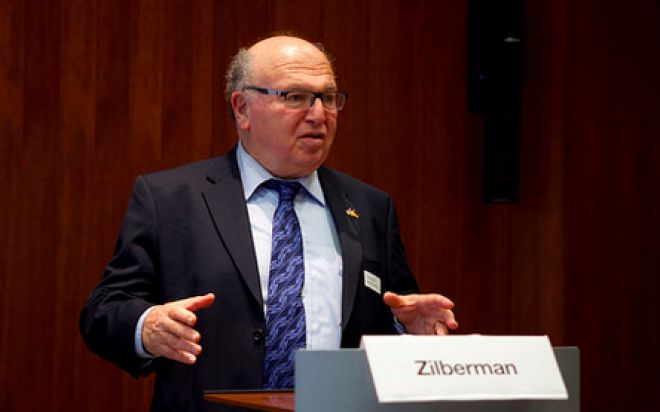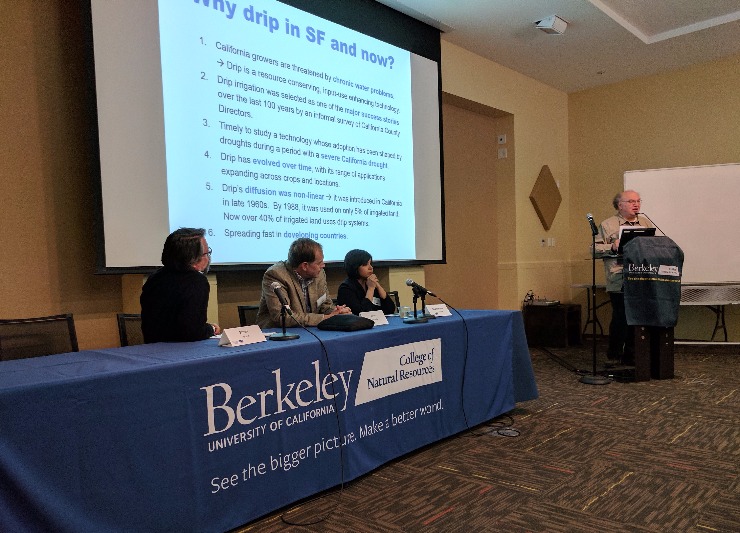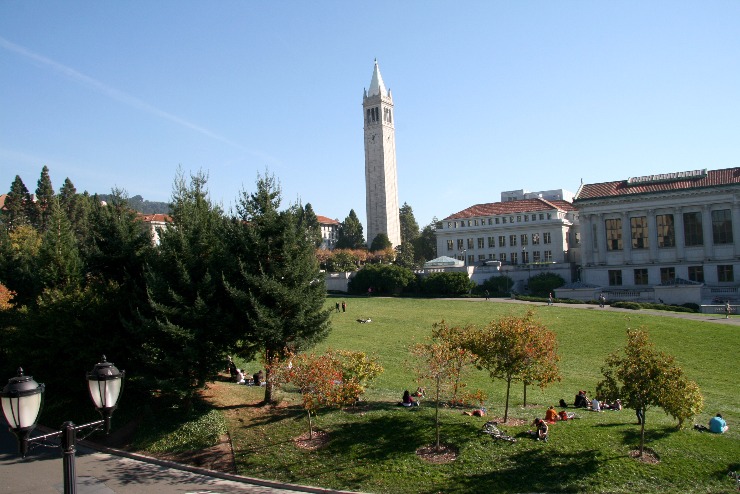
Dr David Zilberman
Solidaridad: David, you are an award winning researcher and one of the most cited scholars in your field. You’ve published over 20 books and hundreds of journal articles. You have masses of consulting experience with organizations such as the World Bank, FAO, USDA and CDFA, and businesses such as Mars. You’re an expert in agricultural and environmental policy, the economics of innovation, risk and marketing, water, biotechnology and climate change. Not to mention president elect of the Agricultural & Applied Economics Association, fellow of the Association of Environmental and Resource Economics and member of the European Academy of Sciences and Art. So, Dr Zilberman, it isn’t as if you haven’t got enough to do. Why take on the task of organizing a conference on innovations in agrifood supply chains?
Dr Zilberman: While the food sector is one of the oldest industries in the world, it is constantly evolving with rapidly advancing technology, changing institutional landscapes and trade dynamics, and consumer willingness to experiment and pay. The world thrives on innovation and much of my research has focused on understanding how innovations are implemented, especially in the agrifood sector. Implementing new ideas is a big challenge, which requires identifying clear market demand, and optimizing production processes and supply chains. In the last few years, I have realized that the design of a supply chain, which is the organizational structure and system, is the key to successfully implementing a new innovation.
I have also learned that simply relying on theoretical and analytical techniques to study supply chains is insufficient because there is much to learn from real world case studies. Take the case of Tyson Foods in the US, a large livestock producer, which was started by truckers who were moving chickens from Arkansas to New York. They started providing feed to the farmers who produced the chickens, and later on, decided to breed their own line of chickens. Today, they process the chickens into packaged parts and sell them to supermarkets throughout the world; from simply transporting to managing an end-to-end supply chain.
Understanding the motivation behind each design decision along the supply chain, and evaluating their economic, social and environmental implications, can be very valuable to enhancing both profitability and sustainability.
Solidaridad: What is your vision behind the workshop you are organizing together with Solidaridad?
Dr Zilberman: The workshop’s key premise is that innovation can take many forms – it could mean the introduction of new products, new production processes or changing production locations, which in turn, leads to the design of new supply chains. While much of the economic thinking on agrifood systems takes the structure of supply chains and markets as given, this workshop emphasizes the importance of supply chain design, which can include diverse actors, as key to implement innovation. Further, the social, economic and environmental impacts of supply chains also need to be examined as pathways to innovation.
What is unique about our event is that it brings an analytical lens, thanks to presenters from academia, combined with real world perspectives provided by industry leaders and civil society stakeholders. A lot can be learned from such exchanges; I’d like to see more of this.
Solidaridad: Why partner with our network?
Dr Zilberman: Solidaridad, a leading global not-for-profit organization that works on the social, economic and environmental aspects of supply chains is an ideal partner for us. With Nico Roozen as their executive director, they are clearly leaders of innovation in agrifood supply chains. They work with actors from both the upstream and downstream ends of the supply chains for numerous commodities. They have a pragmatic and holistic approach towards strengthening entire supply chains, with the objective of improving the sustainability of smallholder farmers. It doesn’t hurt that I have also worked with the managing director of Solidaridad North America, Sebastian Teunissen, when he was a professor at Berkeley and I have, of course, known you Madhyama, as my former student and research assistant. So, it is great to build this partnership together.

David Zilberman presenting at a panel on innovation in water conservation at the agrifood supply chain workshop 2017
Solidaridad: Why did you choose the People-Planet-Profitability theme for the workshop?
Dr Zilberman: The global food and beverage industry is facing some serious challenges including water scarcity, resource depletion, food insecurity and climate change. Companies worry about securing quality inputs for their business, even as they need to adapt to rapidly changing market preferences. Increased attention, by consumers and investors, to food safety, transparency and sustainability is adding a new dynamic to the industry. Employing millions of people globally, the agrifood sector is also challenged on poor labour practices and human rights issues. So, creating a more sustainable food production and consumption system will require holistic solutions that encompass the entire supply chain. This year’s programme will shine a spotlight on these issues and examine innovation to address these challenges.
Solidaridad: Tell us about the speakers you are bringing on for the workshop.
Dr Zilberman: This time, we’re focusing on economic, social and environmental innovation in supply chains because all three aspects must be addressed to achieve meaningful change. So, we will have a great lineup of speakers covering all the bases.
Nico Roozen, the father of the Fairtrade labeling movement and a pioneer in sustainability, will be speaking in North America for the first time. Not only did he forever change the food sector, he did so by leading the transformation of Solidaridad, a tiny Dutch NGO into a global network that is facilitating sector-wide, disruptive transformation in several commodity supply chains, while always keeping the interests of smallholder producers in mind.
We have a new partnership with the University of Guelph and Dr Julia Christensen Hughes, dean of the College of Business and Economics, will provide a Canadian perspective on supply chain innovation.
Food entrepreneur and “chocolate legend” John Scharffenberger, Michael Boland, professor and director of the Food Industry Center at the University of Minnesota, drip irrigation evangelist Naty Barak of Netafim and Jim Lugg of Jim Lugg and Associates, California, are all fantastic speakers with valuable experience and insights. California farmer and processor Stuart Woolf and Chad Sokol of Costco Wholesale will be offering producer and retail perspectives. We are also lining up representatives from philanthropic foundations, other multinational companies and academia. Stay tuned for updates on the programme website.

The University of California, Berkeley campus
Solidaridad: What will participants gain from the workshop?
Dr Zilberman: Our workshop, since 2016, has attracted scholars of agribusiness and food systems, industry executives, and practitioners from NGOs, government, and multilateral organizations. Participants will get an under-the-hood understanding of supply chain innovation with exposure to diverse international case studies. They will also gain a conceptual understanding of economic models and advanced theory that underpin the design of profitable supply chains. This year, we have also included a case-working section where participants can apply what they have learned in the workshop. There will also be many opportunities for discussion and networking, and a certificate of completion from UC Berkeley will also be provided.
I am really excited about the conference this time again and I look forward to seeing many people participate and spark rich discussion and learning.
Early bird discounts available until 15 January 2018. For registrations and further information, please visit the programme website.
